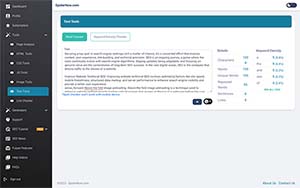Website Content updated with Technical SEO Tools
Understanding the steps it takes to get you towards the top of the SERPs and how to stay there

Website Content for SEO Rankings
There are many ways to optimize your website and prepare it for the SERPs. I am going to only focus on the ones that I believe matter the most to get you the biggest return for your time. I’ll also dive into the things you can do to prepare your pages to be indexed and crawled correctly. You must have a responsive website before you can implement the following suggestions to rank your website.First thing you should understand is that many search engines do not post every ranking signal, there are over 200 of them, which is why experience and knowledge really matters. One of the reasons why many rules are not posted online is because some programmers will intentionally violate search engine guidelines and bend the rules or exploit holes in the system in order to gain higher rankings. This is called Black Hat Marketing. When this occurs it makes it more difficult for the search engines to do their job since their focus is serving up useful Search results to the users on their website. Many times website owners have unintentionally broken SEO guidelines by creating spam pages believing it would help their rankings. The problem is that website patrons don’t typically like spam content, feeling duped, don’t return to the website, and sometimes the search engine that sent them there. Thus the reason that the end result usually ends up being that website owners get their pages penalized with lower rankings or banned from the search engine altogether. This is why following the guidelines and rules (published and unpublished) can help make or break your website’s race to the top of the SERPs. Below are some basic rules and ranking signals to follow that will immediately improve your website relevancy, resulting in better rankings.
Writing Your Content for improving SEO
One place to start is with spam. When thinking about this problem the first thing you need to understand is what spam actually is. For our purposes I’ll be using the target keyphrase of 'Orlando Hotels'. Spamming keywords is when you constantly repeat the same words over and over again in attempts to rank higher in search engines such as 'Find Orlando hotels so you can book cheap Orlando hotel rooms while you are visiting Orlando.' This is what search engines consider to be spam, and it can actually hurt your website’s rankings in the long run instead of helping. Search engine algorithms will understand your focus is on Orlando Hotels if you keep it simple, so instead show other related keywords such as nearby cities, theme parks such as Disney World, MCO airport, etc. Now if we rewrite the above spam sentence to the following, 'Find Disney World resorts for your next family vacation and book cheap hotel rooms while you are visiting the Lake Buena Vista area.' we can see how the quality improves for both the user and the SERPs. See the difference? Removing the spam content while writing with quality content will engage your users with useful information and links will pay off with higher rankings, increased number of site visitors, and lower your bounce rate.Another example of website owners harming their rankings is when they use a technique known as keyword stuffing on their pages. Keyword stuffing is when you load your web page with large amounts of keywords in order to trick the search engines into ranking you higher. For example, 'Find cheap, discount hotels near, around, close to, theme parks in Orlando'. What website owners do not understand sometimes is that search engines can actually counts how many commas come in a row during a single sentence. So if your page is filled with sentences crammed with commas, then beware that search engines are counting those commas and will view your page as spam. The rule I have discovered over the years to follow is not to include more than one sentence per paragraph with more than 3 commas in a row while doing this only once on every other paragraph if you must use it. The key is making sure you are not doing this to every paragraph or your users will see this and may view it as useless information and leave your website immediately resulting in a higher bounce rate. How does it help you if users do not come back because they believe your content is useless to them?
This next type of spam is something I see often. Spamming backlinks or internal links will not improve your rankings, ever. This is where website owners display many links on a web page all together in order to rank internal pages or gain link juice (I’ll explain more about what link juice is later) by linking to external web pages. Do this too much and you could be penalized for what is called Link Farming. This is when you purposely increase the number of links coming to your pages from larger, more quality websites for the sole purpose of gaining link popularity. Quality means everything when it comes to links. Connect pages to both internal and external pages that are relevant, and link to specific pages from external sites that are relevant, not just to your homepage. For example, If you are connecting a link from your web page called 'Orlando hotels' to an external website, do you think it would find the homepage of Hotels.com more relevant or the actual Orlando page on the Hotels.com website more relevant? You could even connect it to other relevant pages such as theme park pages, nearby cities, etc. if you want to do so. Let’s take this a step further. What would you call the anchor text or the name of the link? A simple anchor text would be 'Orlando hotels' if it was a page about hotels or 'Orlando theme parks' if it was a page about theme parks or even more detailed 'Disney World Orlando' if it was a page about the Disney World theme park. This is called 'link juice' which is where the value passed from one page to another or vice versa is viewed as valuable and worth promoting, this is also a big ranking signal with the SERPs. Again, think of relevance. It means everything when ranking in the SERPs.
Let’s say that you have a page on your website for 'Orlando hotel' that has a URL called https://www.Your-Website.com/orlando-hotels and you wanted to connect it to an external website such as Hotels.com. You would not connect it to their homepage as it is irrelevant to the keyphrase Orlando. You would want to connect it directly towards their Orlando hotel pages which would be relevant to your page.
Here is an example of how it would be used. Please note that the following link below for Hotels.com is not real but solely for example purposes only:
This what you would add to your Orlando hotel page: <a href="https://www.hotels.com/de1404711/hotels-orlando-florida/" target="_blank" />Downtown Orlando hotels</a>
Notice that the link above does not connect to the homepage of Hotels.com but to their actual page for Orlando hotels? This is how you handle internal links on your website as well. Connecting relevant pages with supporting keyphrases is how you create link juice and will help boost your website in the SERPs.
We previously discussed issues with using repetitive commas in a sentence but the same goes for links as well. If search engines view many links grouped on a page in a row it can be interpreted as spam. If you have to list links on a page in a row then you should be smart and cautious about how you list them. Take, for example, if you have to list out the U.S. States or cities you service on a page then listing them as 'Orlando Hotels', 'Miami Hotels', 'Sunrise Hotels', etc. is not advisable since it will count the overuse of the word 'hotels' you used on the page. Instead use the title and content of the page focused on the 'Orlando hotels' surrounding area and then list your cities like 'Orlando', 'Miami', 'Sunrise' and then link those pages to their relevant city hotel pages. Search engines will view those links as pages about hotels even without you needing to spam the word 'hotel' after each city name.
Search engines count the number of words on a given page and then will rank the page according to how often each word is used. This is called Keyphrase Density (the number of times a specific keyphrase shows up on a page compared to the number of words). For example, if your Orlando hotels page has a total of 100 words on it and you repeat the keyphrase 'Disney hotels' 25 times chances are you will be penalized with keyword stuffing or overloading a page with specific keywords. So again, stay away from repeating keywords, commas and grouping many links together on a single page, you will surely not rank well if you do so. You can check the Keyphrase Density of your page with this tool. Where you can find the Keyword Density Checker tool:
Subscribe to use our Keyword Density software
Get access to all of our tools and tutorials
Get access to all of our tools and tutorials
When you write content, instead of using the words 'Orlando hotels'' over and over again, consider spreading it out and varying your keywords and their frequency. For example, 'Orlando hotels' or 'hotels in Orlando' or 'hotel rooms near MCO airport' all mean the same thing as 'Orlando hotels' so you should change it up as much as possible. The way I think of creating my keywords on a page is this, if a user is looking for hotels in Orlando not everyone will not type it exactly as 'Orlando hotels' into the search engines. They will search by different keyphrases such as 'discount hotels in Orlando', 'hotel rooms near downtown Orlando', 'cheap hotels in Central Florida' or even 'MCO airport accommodations'. This is how you should be thinking when it comes to anchor text or links on your website. Search engines have databases filled with relevant keywords for the term 'Orlando' so keyword stuffing is not necessary, which you will learn more about when I discuss RankBrain in a later chapter. Let your content pages flow freely about the area you are servicing by mixing it up and referring to other nearby cities, local events, restaurants, things to do or theme parks in the area. This applies to all industries when you write content for your pages. Engage your users with useful and relevant information that will not only improve your rankings, but get your users coming back for information on local events, links to useful websites, or other engaging content you added to the page. Show them that you are an expert in the area and not just looking to make a quick sale which will help improve your repeating customer base.
Remember to check the spelling and grammar for each web page on your website. Nothing makes a user more annoyed than reading content that is poorly written or does not make grammatical sense. One sure way of checking is to use Google Docs. I have used Microsoft Word in the past but both software tools can interpret spelling and grammar differently. I personally trust Google Docs for improving content, after all it uses the same concept Google search uses to rank your content in the first place.
Another rule to keep in mind is that search bots will not read past 100 links on a page so if you are considering overloading links on a single page you may want to change the way you are building the pages. You should consider splitting them off into separate pages or even separate categories. This is where site structure and utilizing Breadcrumb Markup can come into play which you will learn about in a later chapter.
The above information is a brief explanation of this technique. To learn more about how we can help your company improve its rankings in the SERPs, contact our team below.

Bryan Williamson
Web Developer & Digital Marketer

Web Developer & Digital Marketer
Digital Marketer and Web Developer focusing on Technical SEO and Website Audits. I spent the past 26 years of my life improving my skillset primarily in Organic SEO and enjoy coming up with new innovative ideas for the industry.













